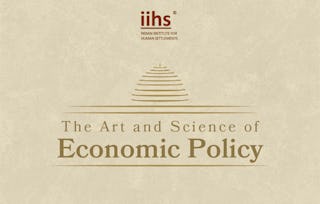Welcome to the Economics of Reforms and Regulation course! By the end of this course, you will understand the economics of reforms and regulation, with a focus on contemporary issues and debates. You will be introduced to the rationale for an economic role of the government viz-a-viz imperfections in the real markets and inform them of some of the dimensions of the debate on state-market dichotomy. You will learn to recognize good regulatory practices by carefully considering regulatory structures across the globe. Instruments of regulation, both economic and social, are investigated using examples and case studies from various sectors. In particular, the course examines reforms in the public procurement and financial sector, and regulatory frameworks in the energy sector and will inform you of the need to revisit antitrust laws in the new-economy industries. You will also be able to peek into regulatory designs that were ground-breaking in their use of behavioral economics, new auction formats, and calls for similar creativity in formulating regulations as the world becomes radically uncertain. Lastly, you will be able to re-examine the role of the state taking cognizance of non-traditional views, specifically those from the field of New Institutional Economics, the idea of a Developmental State, and Mariana Mazzucato’s idea of an entrepreneurial state.
即将结束: 只需 199 美元(原价 399 美元)即可通过 Coursera Plus 学习新技能。立即节省

您将学到什么
Explain the economic rationale for reforms and regulations in different market settings.
Evaluate the impact of several types of regulatory policies on market outcomes and social welfare.
Examine the effectiveness of the regulatory policies in various contexts.
Recognize the need for unconventional wisdom in assessing the role of the State and its instruments of reforms and regulation.
您将获得的技能
要了解的详细信息

添加到您的领英档案
September 2025
25 项作业
了解顶级公司的员工如何掌握热门技能

该课程共有7个模块
In this module, you will be introduced to a few known fundamentals of welfare economics, delineating efficient outcomes of a “perfectly competitive” market, albeit under strong assumptions. Through a simple market experiment, you will be able to learn that competitive equilibrium is a good predictor of price and quantity even if we assume weaker conditions. This module will answer some of the obvious questions such as why governments intervene in markets, and what are some of the reasonable grounds for governments to intervene in markets. To answer these questions, this module examines real markets that are “imperfect” and therefore unable to produce, consume, or distribute in accordance with what is best for everyone. Lastly, this module characterizes some of the dimensions of the debate on state-market dichotomy, both in the context of free-market advocacy and in the light of historical evidence of government failures across the world. The need for developing a mutually supportive system for market and non-market institutions is emphasized upon.
涵盖的内容
10个视频7篇阅读材料4个作业1个插件
In this module, you will gain an understanding of the regulatory institutions and structures that exist to facilitate the functioning of markets while protecting larger social interests. You will be introduced to the role of economic regulation in promoting competition, consumer protection, and economic efficiency.
涵盖的内容
9个视频4篇阅读材料3个作业
This module focuses on the roles and functions of regulatory institutions in ensuring public health, safety, and environmental protection, as well as the legal and policy frameworks that guide their decision-making processes. In this module, you will be introduced to policy assessment tools offered in cost-benefit analysis with more emphasis upon non-market valuations. The module concludes with discussions on some known (and some not so) regulatory instruments that are used to lower environmental pollution.
涵盖的内容
9个视频4篇阅读材料4个作业
This module will introduce you to major regulatory policies and reforms in the public finance sector, specifically those undertaken in the banking sector and in public procurement processes. The module stresses upon the need for good quality regulation in the banking sector which is significant to the financial systems and the health of the economy as a whole. You will also be able to learn the workings of public procurement systems and how governments need to prioritize reducing corruption in public purchases of goods and services by implementing efficient and competitive designs.
涵盖的内容
8个视频4篇阅读材料3个作业
In this module, you will be introduced to the key reforms and regulations in the energy sector and in new economy industries. Beginning with various policy instruments that are used to regulate the energy sector, the module also discusses the rationale for government intervention in energy and examines power regulations in the UK, following privatization. You will also be introduced to the meaning and importance of the new economy and the need for government regulations to adapt in the context of technological revolutions in data mining and communications.
涵盖的内容
8个视频3篇阅读材料3个作业
In this module, you will gain insights into regulatory frameworks that were innovative in their use of techniques and insights from behavioral economics and novel auction formats. The module emphasizes the need for regulators to adopt similarly inventive approaches to regulation as the world becomes radically uncertain.
涵盖的内容
7个视频4篇阅读材料4个作业
This module discusses the role of the state through two alternative thought processes that challenge the conventional views offered in mainstream economics. One through the lens of a subdiscipline of economics called “New Institutional Economics” and the other through the lens of “the Entrepreneurial State” as developed by Mariana Mazzucato. In a similar vein, the idea of a developmental state is explored where the state takes a more active role and pursues industrial policies.
涵盖的内容
9个视频1篇阅读材料4个作业
攻读学位
课程 是 O.P. Jindal Global University提供的以下学位课程的一部分。如果您被录取并注册,您已完成的课程可计入您的学位学习,您的学习进度也可随之转移。
位教师

从 Economics 浏览更多内容
 状态:免费试用
状态:免费试用IE Business School
 状态:预览
状态:预览 状态:免费
状态:免费Parsons School of Design, The New School
 状态:预览
状态:预览Indian Institute for Human Settlements
人们为什么选择 Coursera 来帮助自己实现职业发展




常见问题
To access the course materials, assignments and to earn a Certificate, you will need to purchase the Certificate experience when you enroll in a course. You can try a Free Trial instead, or apply for Financial Aid. The course may offer 'Full Course, No Certificate' instead. This option lets you see all course materials, submit required assessments, and get a final grade. This also means that you will not be able to purchase a Certificate experience.
When you purchase a Certificate you get access to all course materials, including graded assignments. Upon completing the course, your electronic Certificate will be added to your Accomplishments page - from there, you can print your Certificate or add it to your LinkedIn profile.
Yes. In select learning programs, you can apply for financial aid or a scholarship if you can’t afford the enrollment fee. If fin aid or scholarship is available for your learning program selection, you’ll find a link to apply on the description page.
更多问题
提供助学金,



